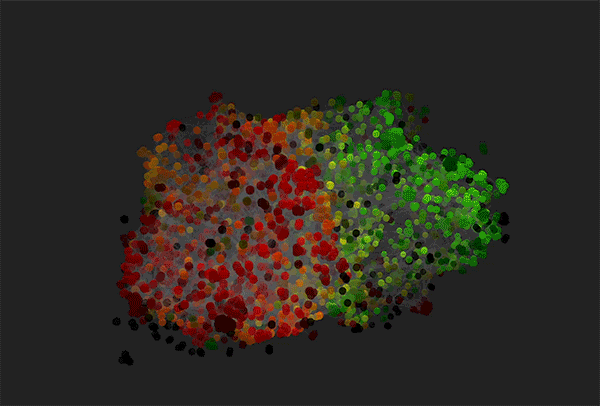Hello Nature readers, would you like to get this Briefing in your inbox free every day? Sign up here.
Weather forecasting is benefitting from the boom in artificial intelligence.Credit: NESDIS/STAR/NOAA/Alamy
Microsoft’s artificial intelligence (AI) model Aurora accurately predicts weather and, for the first time, air pollution for the whole world — and does so in less than a minute. Global air pollution forecasting is much more complex than weather forecasting, says machine-learning researcher Matthew Chantry: “That was the thing where I went: wow, that’s a really cool result.” The AI forecasts are as good as those from conventional mathematical models and have “orders of magnitude smaller computational cost”, say Microsoft researchers.
Nature | 4 min read
Reference: arXiv preprint (not peer reviewed)
India’s Prime Minister Narendra Modi has claimed victory for his alliance in the national election, heralding a third term in office for the leader. But the result brought a shock for Modi, whose alliance, led by his Bharatiya Janata Party (BJP), didn’t get as big a majority as expected. The BJP and its coalition partners will form a government that is a strong supporter of science in a broad sense, researchers say. But they caution that the beneficiaries might not be evenly distributed, with the returned government focusing on specific areas of innovation.
Nature | 4 min read
The risks of MDMA as a treatment for post-traumatic stress disorder outweigh the benefits, advisors to the US Food and Drug Administration (FDA) have decided. The drug, also known as ecstasy, is one of several psychedelics that seem to greatly reduce symptoms of mental illnesses. But independent advisors and FDA staff expressed concerns with the clinical trial data: the drug’s psychoactive effects mean it’s difficult to design placebo-controlled studies and the FDA wouldn’t be able to evaluate the psychotherapy that accompanies drug treatment.
Nature | 6 min read
Neuroscientist Karen Ashe plans to retract her team’s landmark Alzheimer’s paper after acknowledging that it contains manipulated images. The 2006 study, which suggested that the disease could be caused by an amyloid beta protein, has been cited nearly 2,500 times. “I had no knowledge of any image manipulations in the published paper until it was brought to my attention two years ago,” Ashe wrote on the discussion site PubPeer, adding that she stands by the paper’s conclusions. Scientists are divided over whether the problems with the paper undermine the dominant, yet controversial, theory that beta-amyloid plaques are a root cause of Alzheimer’s disease.
Reference: Nature paper (from 2006)
Infographic of the week

A new technique called ‘molecular pixelation’ uses DNA to map the location of proteins on individual cells — such as this B–T cell complex. Researchers created ‘molecular pixels’ by using DNA to create a grid of tiny nanometre-sized squares. Antibodies are then attached to the DNA squares, and these antibodies can bind to specific proteins on the surface of the cell. Once the antibodies have bound to the proteins, the DNA squares can be imaged using a microscope. This allows researchers to see how the proteins are arranged on the surface of the cell. Reference: Nature Methods paper (Filip Karlsson et al./Nature Methods)
Features & opinion
Last month we asked what you’d like to know about the possibly trillions of cicadas emerging in the United States, and now three researchers provide the answers. Along with plenty of insight into the insects and how they interact, we have this jewel: if you run a lawnmower, look out — female cicadas are attracted to the noise and will flock to you. And no, the incessant din of the insects — which can be as loud as a jet engine — probably won’t cause temporary psychosis. It could actually help some people by temporarily masking tinnitus.
Nature | 5 min read
Carbon dioxide is often used as a proxy for healthy air — such as when CO2 monitors are deployed to determine COVID risk. Now it seems that high levels of CO2 actually help viruses to survive in the air. Using an innovative instrument to study airborne pathogens in unparalleled detail, researchers determined that CO2 appears to help keep the particles we exhale at a pH-level that is more hospitable to viruses. “By increasing the CO2 in the air, we’re getting rid of a natural means by which viruses become inactivated,” said environmental chemist Allen Haddrell, who led the new work. “It’s fascinating, but it’s also horrifying.”
“Creating a theory of everything isn’t exactly easy,” notes philosopher of science Sam McKee in the understatement of the year. But it’s a worthwhile quest, he argues, that doesn’t get enough attention. Physicists as storied as Albert Einstein were mocked for their attempts — and that has instilled a fear in today’s researchers, posits McKee. “We may be looking at the prospect of a theory of everything only coming from those who have accomplished so much they can afford the potential embarrassment.”